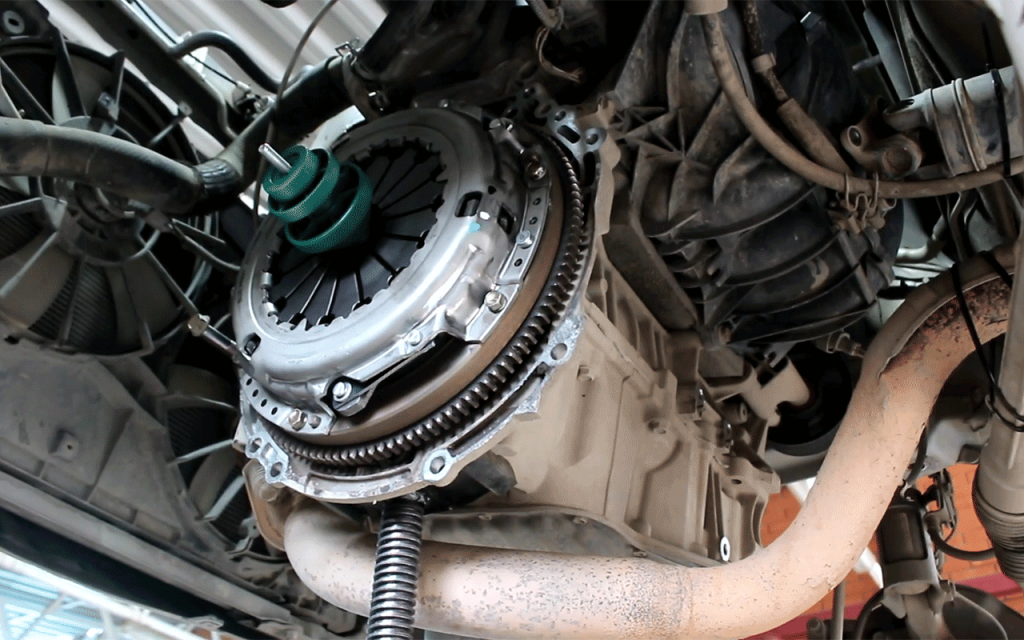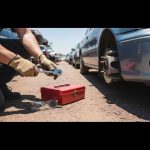Should You Buy a Used Toyota RAV4 Transmission from a Junkyard?
Buying a used Toyota RAV4 transmission from a trusted junkyard is a smart choice if you want to save money on car repairs and keep your SUV running smoothly. You can save up to 75% compared to buying a new transmission, which makes a used one a great option. Here’s what you need to know to find, buy, and replace a used Toyota RAV4 transmission from a junkyard.
Cost Savings: Why Buying Used is Worth It
Buying a used Toyota RAV4 transmission can save you 50-75% compared to getting a new one. For example, while a new RAV4 transmission can cost between $3,000 to $4,000, you might find a good used one from a junkyard for $500 to $1,500, depending on its condition and the year of the car.
Getting a used part from junkyards like those listed on U-Pull-It.com can make a big difference, especially if you’re on a tight budget. With the money you save, you can pay for installation or other car repairs.
Cost Comparison Table
Here’s a table that compares the cost of a new transmission versus a used one from a junkyard:
| Transmission Type | Estimated Cost (USD) | Warranty Availability |
|---|---|---|
| New Transmission | $3,000 – $4,000 | Manufacturer Warranty (3-5 years) |
| Used Transmission | $500 – $1,500 | 90-Day Junkyard Warranty, Optional Extended Warranty (Up to 1 year) |
The table shows how buying a used transmission can save you a lot of money while still offering some level of warranty protection.
Finding the Right Transmission for Your Toyota RAV4
To find the right used Toyota RAV4 transmission, follow these steps:
- Local Junkyards: Start by looking for junkyards that specialize in Toyota parts. You can use the junkyard directory at U-Pull-It.com to find options near you. Local junkyards are usually the best place to find compatible parts without high shipping costs.
- Online Databases: Many junkyards have online inventories where you can check if they have the transmission you need. This can save you time by narrowing down your search before you go in person.
- Interchange Systems: These systems help you find compatible parts from other vehicles. For example, some Toyota or Lexus SUVs might have transmissions that fit the RAV4. This can help you expand your options.
- Verification: Make sure to double-check the year and compatibility of the transmission. Even small differences between model years can mean that a part won’t fit or work properly.
Compatibility Verification in Detail
- Transmission Codes and VIN Matching: Use the Vehicle Identification Number (VIN) to figure out the correct transmission type for your Toyota RAV4. The VIN contains details about your car’s setup, including the transmission code. Make sure the transmission code on the used part matches your RAV4’s VIN to avoid problems.
- Model Year Differences: Different years of the RAV4 may use different types of transmissions. For example, some models might use a traditional automatic transmission while others use a continuously variable transmission (CVT). Knowing these differences can help you avoid buying the wrong part.
Tools Needed and Removal Process
Tools to Bring to the Junkyard
If you’re removing a transmission from a junkyard, you need to bring the right tools to make the job easier. Here’s what you need:
- Socket set and ratchets: For loosening and removing bolts of different sizes.
- Wrenches (various sizes): Needed to reach tight spaces and unbolt parts.
- Screwdrivers: For removing screws or clips holding parts in place.
- Pry bar: Helpful for separating parts that are stuck due to rust or dirt.
- Jack and jack stands: To safely lift the vehicle and hold it in place while you work.
- Transmission fluid catch pan: To catch the fluid when you drain the transmission and avoid a mess.
- Penetrating oil for stuck bolts: This makes it easier to loosen bolts that have seized up over time.
Steps to Remove a Toyota RAV4 Transmission
- Preparation: Wear sturdy clothing, gloves, and safety goggles. Safety gear is important when working under a car.
- Disconnect the Battery: This prevents electrical accidents. It’s a key safety step whenever working on car parts involving electricity.
- Drain Transmission Fluid: Use a fluid catch pan to prevent spills. Draining the fluid first makes the rest of the job easier.
- Remove Driveshaft and Axles: These connect to the transmission. Removing them first will make it easier to take out the transmission.
- Disconnect Electrical Connections and Shift Linkage: Carefully disconnect all wires to avoid damage. This will make removing the transmission smoother.
- Support the Engine: Use a jack or support to hold up the engine when you remove the transmission.
- Remove Transmission Mount Bolts: Carefully remove these bolts and then lower the transmission. Once these bolts are out, the transmission can be lowered safely.
Inspection Checklist for Used Transmissions
Before buying a used transmission, it’s important to inspect it to make sure it’s in good shape. Use this checklist to help guide you:
- Visual Inspection:
- Cracks and Rust: Look for any cracks or rust, especially on the outside. Cracks mean structural problems, while rust could mean moisture damage.
- Fluid Leaks: Check for leaks around seals and gaskets. Leaks might mean that seals are worn or there are internal problems.
- Transmission Fluid Condition: Look at the fluid. It should be bright red and should not smell burnt. Dark or smelly fluid can be a sign of internal damage.
- Functional Testing:
- Rotate Input Shaft: Try turning the input shaft. It should move smoothly without grinding sounds. Grinding means there could be internal issues.
- Check Mounting Points: Make sure all mounting points are not cracked. Broken mounts can make it hard to install and lead to future problems.
- Common Issues to Watch For:
- Shifting Problems: Some Toyota RAV4 transmissions may have shifting problems, especially if they have high mileage. Check for signs that the transmission shifts poorly.
Purchasing Process Guidance
Negotiation Tips
When buying a used transmission, you can often negotiate the price to get a better deal. Here are some tips:
- Do Your Research: Find out the average market price for the transmission you need. This will help you know whether the asking price is fair.
- Use Defects to Negotiate: If you notice any defects or wear during your inspection, use these to negotiate a lower price.
- Be Polite and Firm: Always be respectful when negotiating, but make sure to stick to your budget.
Payment Methods and Receipts
- Payment Types: Most junkyards accept cash, and some accept credit cards or checks. Ask about payment options before buying.
- Receipt Importance: Make sure to get a receipt or proof of purchase. This is crucial if you need to make a warranty claim.
Shipping and Handling Considerations
- Arranging Shipping: If the junkyard isn’t local, ask if they offer shipping. Make sure the transmission is properly packaged to avoid damage.
- Shipping Costs: Be aware that shipping costs can add up, so factor that into your overall budget.
Installation Options
DIY vs. Professional Installation
- DIY Installation: If you have the skills and tools, installing the transmission yourself can save you money. However, it’s a complicated job that requires experience and special tools.
- Professional Installation: Hiring a professional mechanic ensures the job is done right. Look for a mechanic with ASE (Automotive Service Excellence) certification, which shows they have the skills needed for the job.
Finding a Qualified Mechanic
- Ask for Recommendations: Ask friends or check online reviews to find a reputable mechanic.
- Check Certifications: Look for mechanics with ASE certification. This means they are trained and experienced in working with transmissions.
Post-Installation Checks
- Test Drive: After installation, take the vehicle for a test drive in different conditions (city, highway) to make sure the transmission is working well.
- Check for Leaks: Look under the car for any leaks after installation.
- Smooth Shifting: Make sure the transmission shifts smoothly without any jerking or noises.
Legal and Administrative Considerations
Return Policies and Core Charges
- Return Policy: Always ask about the return policy in case the transmission doesn’t work as expected.
- Core Charges: Some junkyards charge a core fee, which is refunded when you return the old transmission. Make sure to ask about these fees.
Paperwork Requirements
- Bill of Sale: Get a bill of sale or any legal paperwork required for buying a major car part. This is important for records and warranty claims.
Environmental Regulations
- Proper Disposal: Make sure old fluids and damaged parts are disposed of correctly, following local environmental regulations. This helps keep the environment clean.
Expanded Interchangeability Information
Compatible Models
- Other Models: Some Lexus SUVs and other Toyota models may have compatible transmissions for the RAV4. Ask the junkyard or use an interchange system to find out which models match.
Using Interchange Databases
- Hollander Interchange: Use tools like Hollander Interchange to see which parts are compatible with your RAV4. These databases are very helpful for finding parts that fit.
Environmental Benefits of Buying Used Parts
Sustainability
- Recycling: Buying used parts helps recycle and reduce waste. Instead of creating new parts, you’re using existing ones, which is better for the environment.
Carbon Footprint Reduction
- Lower Emissions: Manufacturing new parts uses a lot of energy. By reusing parts, you help reduce the carbon emissions that come from making new components.
Additional Resources and Links
Instructional Videos
- Removing and Installing: Watch YouTube tutorials that show how to remove and install a transmission. These can be very helpful if you’re doing the job yourself.
Official Toyota Resources
- Toyota Manuals: Check out Toyota’s official manuals for technical details about your RAV4. These can help make sure you’re getting the right part and installing it correctly.
Safety Precautions (Expanded)
Working in Junkyards
- Be Aware of Your Surroundings: Junkyards can be dangerous, with sharp objects and heavy parts around. Always pay attention to where you’re walking.
- Follow Junkyard Rules: Many junkyards have rules, like wearing closed-toe shoes or not climbing on stacked cars. Follow these rules to stay safe.
- Weather Considerations: Avoid working in bad weather, like heavy rain, which can make the ground slippery.
Handling Heavy Components
- Use the Right Tools: Lifting a transmission is heavy work. Use a transmission jack or have a friend help to avoid injuries.
- Wear Safety Gear: Gloves and steel-toe boots can protect you from injuries when handling heavy parts.
Testimonials or Case Studies
Success Stories
- User Experiences: “I saved $2,500 by buying a used transmission for my 2015 RAV4 at a local junkyard. It worked perfectly, and the junkyard even gave me a 90-day warranty!” These types of testimonials add credibility and can reassure readers.
Lessons Learned
- Common Mistakes: “I forgot to check the VIN and ended up with an incompatible transmission. Always double-check compatibility before buying.” Sharing mistakes can help others avoid the same problems.
Conclusion
Buying a used Toyota RAV4 transmission from a junkyard is a great way to save money on car repairs. There are some risks when buying used parts, but you can lower these risks by picking a good junkyard, asking the right questions, and checking compatibility. If you do it right, you can save hundreds, or even thousands, of dollars to get your Toyota RAV4 back on the road.
For more information on where to find quality used parts and salvage yards near you, visit U-Pull-It.com.




